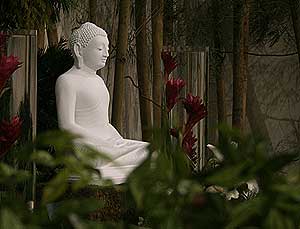 Zen is a word that is frequently used but rarely understood. So what is Zen, really?
Zen is a word that is frequently used but rarely understood. So what is Zen, really?
A traditional origin of Zen is attributed to an encounter between the Buddha and his monks sometime in the fifth century B.C.E. in India. Shakymuni Buddha came into the Meditation Hall where his monks were assembled expecting his daily sermon. Instead, the Buddha held up a flower. One of the monks acknowledged his understanding with a smile.
That monk became the Buddha's first successor in the Zen lineage. Zen was introduced into China in the ninth century C.E., and absorbing some aspects of Chinese Taoism, transmitted to Japan in the thirteenth century. The majority of Zen practitioners now reside in Europe or the U.S., most practicing in the Japanese, Korean, Vietnamese or Chinese Zen traditions.
Essence of Buddhism
The essence of Zen cannot be understood. It must be experienced. Zazen allows this experience to happen, here and now.
When we live authentically in the present moment, here and now, we are free of the oughts and shoulds, the likes and dislikes, the goals and regrets, which cause us so much suffering. The basic truth of Buddhism, in fact, is that we all suffer and that attachments are the cause of suffering. The attachment behind all others is the attachment to the illusion of a separate self or ego.
If everything in the universe is interdependent and transient, there is no substantial, permanent self, even though we act as though there were. We and everything else in the universe make up an integrated, interdependent, and non-dualistic whole. Thus we should respect all beings as ourselves, or as some Tibetan Buddhists say, as our mothers.
Gift of teachings
The gift of the teachings of the Buddha -- who was a mortal like us and not a god -- is that they can help us to find a way to stop suffering. We in the Zen tradition sit -- or do Zazen -- every day alone and, when possible, together. We do not have to change our lifestyle, give up our job or family or enter a monastery and shave our heads to transcend attachments and suffering. There are many paths to this freedom. Countless Christians and Jews have found meaning in Zazen without adhering to the philosophies of Buddhism. For Zen Buddhists, the path is Zazen.
Zen is roomier and deeper than any one sect of Buddhism. We at the Zen Unitarian Universalist Fellowship of Alexandria (ZUUFA) welcome people of any or no faith who want to sit with us. Sitting together creates a meaningful energy, but each of us is free to sit any way that works, as long as we don't disturb the group.
The director of ZUUFA is Richard Collins, Ph.D. Collins is the Chairman of the Department of Arts, English and Humanities at Louisiana State University at Alexandria.
Larry White is the assistant director of the Zen Unitarian Universalist Fellowship of Alexandria. He ia a former CEO of Crossroads Regional Hospital in Alexandria.
White has practiced Zen for over forty years. He can be contacted at larry@staffpointe.com or by phone at (318) 442-7048.

